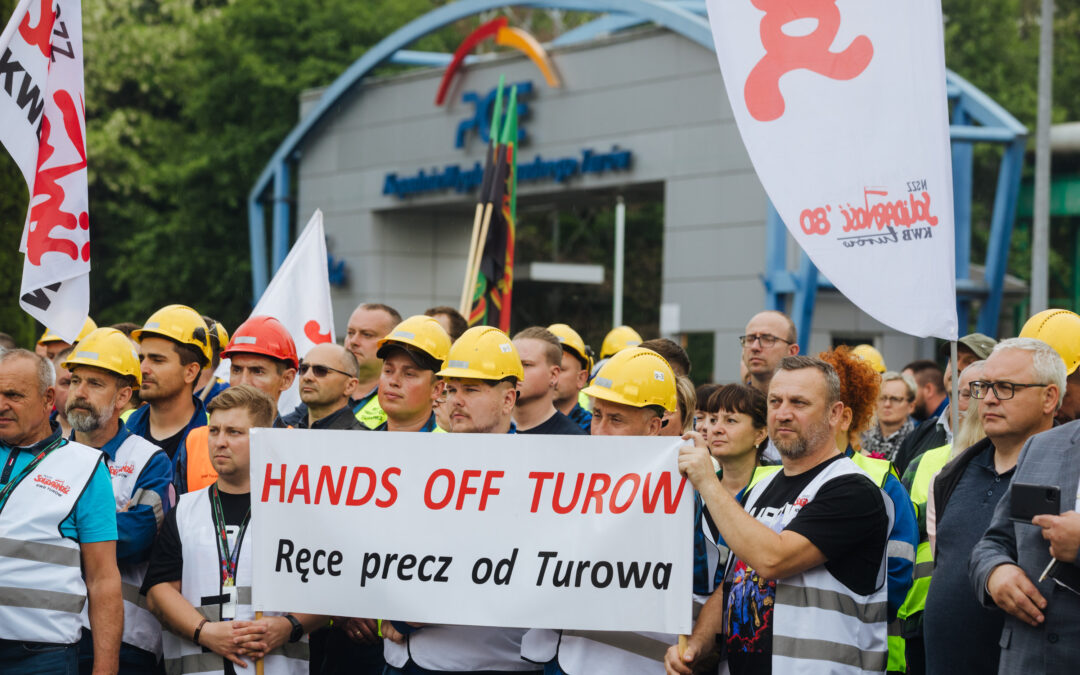A Polish court has issued a ruling that threatens operations at one of Poland’s largest coal mines. It found that the Turów open-cast lignite mine – which was also recently the subject of a dispute between Poland and the Czech Republic – could cause significant environmental damage.
The ruling has been criticised by the government, with the prime minister describing it as “unlawful” because the court “took account of foreign interests” but not Polish ones.
The state-owned firm that runs the mine – which produces coal for a power plant generating around 7% of Poland’s electricity – has pledged to appeal against the court’s decision.
Turów sits on a strip of land in southwest Poland that is sandwiched between Germany and the Czech Republic. For years, local communities and environmental groups in those neighbouring countries have complained that the mine has harmful effects.
A Czech legal challenge led to the European Court of Justice (ECJ) ordering in 2021 that mining operations at Turów be suspended. That order was ignored by Poland, resulting in daily fines of €500,000 until an agreement was reached with Prague in 2022 to settle the dispute.
But subsequently a group of complainants – including the German city of Zittau, the Czech and German branches of Greenpeace, and Polish environmental group EKO-UNIA – filed a legal challenge in Poland against an environmental decision issued by the climate ministry that allows the mine to function until 2044.
In a ruling made last week but only announced yesterday, the provincial administrative court in Warsaw ordered the environmental decision to be suspended, finding that there is a risk of significant damage to the environment.
🔴Sąd wstrzymał decyzję środowiskową dla kopalni Turów. To na jej podstawie @moskwa_anna przedłużyła koncesję na wydobycie węgla brunatnego. Kopalnia i el. Turów nie mają przyszłości a rząd nie ma dobrego planu na sprawiedliwą transformację regionu. pic.twitter.com/2GECT0ddav
— Greenpeace Polska (@Greenpeace_PL) June 6, 2023
The decision was immediately criticised by figures from the Polish government, with Prime Minister Mateusz Morawiecki and state assets minister Jacek Sasin today visiting the mine.
“We want to make it clear: we will certainly not let this mine close,” said Morawiecki, quoted by news service Gazeta.pl. “No court, whether from Brussels or Warsaw, will tell us what security, in terms of energy and for the people who work here, means.”
The prime minister also called the decision “a blatant blow to Polish interests by German lobbyists” and said that “a court ruling that doesn’t take into account the interest of Poles but does take into account foreign interests is unlawful”.
Premier @MorawieckiM w Kopalni Węgla Brunatnego #Turów: Chcę, by cała Polska usłyszała, że to nie jest wyrok na kopalnię. To jest wyrok na 60 tys. ludzi, którzy pracują w kopalni i wokół niej. To wyrok na ich rodziny i bezpieczeństwo energetyczne milionów polskich rodzin. pic.twitter.com/z9Wm9noVq5
— Kancelaria Premiera (@PremierRP) June 7, 2023
PGE, the state energy firm that runs Turów, also announced that it would appeal the court ruling. “No court can stop the work of a legally operating company,” said CEO Wojciech Dąbrowski.
“We provide 7% of Poland’s energy, so the Polish judge’s decision affects the energy security of our country and the interests of about 60,000 people who work in the Turów mine or are associated with it,” he added.
The firm received the backing of Sasin, who said there would be a “long fight” to keep the mine operating. The government has long been supportive of the coal sector, which generates around 70% of Poland’s power, by far the highest proportion in the European Union.
Due to the energy crisis, Poland will not only delay its phaseout of coal but plans to increase production, including opening new mines, says the climate minister.
Coal generates 70% of Poland's power – the most in the EU – and heats one third of homes https://t.co/ovKz9YSjNk
— Notes from Poland 🇵🇱 (@notesfrompoland) November 7, 2022
Representatives of the organisation that brought the legal challenge, however, reject the accusations of acting to the detriment of Poland. “We have long warned that the lack of a good plan for a just transformation of the region is a recipe for disaster,” said Anna Meres of Greenpeace.
“Meanwhile, the government, contrary to the trends in the energy sector and the costs of staying with coal-fired energy, is fighting at all costs to prolong the agony of the sector based on burning fossil fuels,” she added.
Radosław Gawlik of EKO-UNIA argued that “the government and PGE are lying to people from the region” by claiming coal has a sustainable future. He says refusal to give up coal mining has already led to Poland missing out on a billion zloty from the EU’s Just Transition Fund for the Turów region.
👉 Wojewódzki Sąd Administracyjny uznał, że kopalnia #Turów może doprowadzić wyrządzenia znacznej szkody w środowisku.
👉 Skargę na decyzję złożyły jesienią 2022 roku https://t.co/PyyvwY0OmW. @FrankBold_PL, @Greenpeace_PL i @EkoUnia.
↪ NASZ KOMENTARZ: https://t.co/O5GAkcJX08 pic.twitter.com/Q7NAEcKINc
— EKO-UNIA (@EkoUnia) June 7, 2023
Main image credit: The Chancellery of Prime Minister (under CC BY-NC-ND 3.0 PL)

Alicja Ptak is deputy editor-in-chief of Notes from Poland and a multimedia journalist. She has written for Clean Energy Wire and The Times, and she hosts her own podcast, The Warsaw Wire, on Poland’s economy and energy sector. She previously worked for Reuters.




















